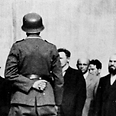
(Illustration)
צילום: באדיבות יד ושם
Learning from the 1930s
Op-ed: European appeasement before World War II reminiscent of current EU attitudes
A variety of major elements in today’s delegitimization of Israel by European agitators recall what Jews experienced in the late 1930s. To study this thoroughly would require a huge effort. Formulating a few key ideas about this however, could easily come from reading a single book which covers that period.
One example is Duff Cooper’s autobiography, Old Men Forget. The author is a former British Conservative minister. He was First Lord of the Admiralty – a British title for the Minister of Marine – at the time of the Munich agreements. On 29 September 1938, England and France abandoned Czechoslovakia to Hitler by agreeing that it had to give up part of its territory to Germany. This Sudetenland was mainly inhabited by ethnic Germans and all the Czechoslovak fortifications were there. This led to the German occupation of the entire country six months later.
Shortly before Munich, British Prime Minister Neville Chamberlain spoke on the radio. Cooper writes that he had no words of sympathy for Czechoslovakia, which he was prepared to betray. “The only sympathy expressed was for Hitler, whose feelings about the Sudetens the PM said that he could well understand.”
Cooper resigned from the cabinet immediately after Munich. This act required great courage. Chamberlain was at the height of his popularity as the agreement promised “peace for all times.” In reality, this meant a respite of less than a year until war broke out after the German invasion of Poland on 1 September 1939.
Cooper often quoted from his diaries. On 22 May 1938, at the time of continuous vicious German verbal attacks on Czechoslovakia, he wrote about a cabinet meeting, “The general feeling seemed to be that great, brutal Czechoslovakia was bullying poor, peaceful little Germany…It was decided to send off a telegram to tell the French to go carefully and not to rely too much on us, and another to urge the Czechs to make large concessions.”
In diluted form this resembles the European Union’s ongoing criticism of Israel and Europe’s tip-toeing around the “peaceful Arab world” where many thousands have been slaughtered by their own countrymen.
In September 1938, another cabinet member Viscount Hailsham, said to Cooper: “It all depends on whether we can trust Hitler.” Cooper asked, “Trust him for what?” He has got everything he wants for the present and he has given no promises for the future.”
Do Arabs want peace?
Can one trust Arab states or the Palestinians today? The great majority of Egyptians want to abolish the Camp David peace treaty in which their country got back Sinai without fighting. The Palestinian Authority glorifies murderers of Israeli civilians and names youth camps, streets and schools after them. Hamas has the genocide of the Jews written in their charter. Should one trust that they want peace?Cooper describes Great Britain’s mood after Munich: “There was to be no war, neither now, nor at any future date….the aged prime minister of England had saved the world.” The positive attitude displayed by Israel’s majority for the 1993 Oslo agreements did not go quite that far. Today we know that this agreement enabled the Palestinians to gradually mobilize large parts of the Muslim world against Israel.
After the outbreak of the Second World War, many British displayed an attitude that Poland was lost anyhow, so why should Britain continue to fight against Germany? Former Liberal Prime Minister David Lloyd George suggested in Parliament that the British government should consider any proposals for peace. Cooper reacted by saying that Lloyd George was suggesting surrender.
While the Germans were spending huge amounts of money on propaganda, the British were allocating none. Shortly after the outbreak of war, Cooper left for the United States on a lecture tour. Before he left, Chamberlain sent a high-ranking official over to request that Cooper abstain from saying anything that might sound like British propaganda.
In his autobiography, Cooper wrote that in retrospect this demand seemed almost incredible. “A former cabinet minister arrives from England and his country has just entered on a great war and he is advertised to lecture all over the United States on topics of current interest. What will his audiences expect of him except information about this war, the causes and the prospects of it? How can an Englishman give such information without presenting and defending the cause of his country? And what better form of propaganda could there be?”
Since Oslo, we have had some Israeli governments emulate Chamberlain’s foolish position. They claimed that “if you do good, you do not need public diplomacy.” The current government does not adhere to that absurd maxim, but there is certainly vast room for improvement in the presentation of Israel’s case to the world.
Dr. Manfred Gerstenfeld has published 20 books. Several of these address anti-Israelism and anti-Semitism










